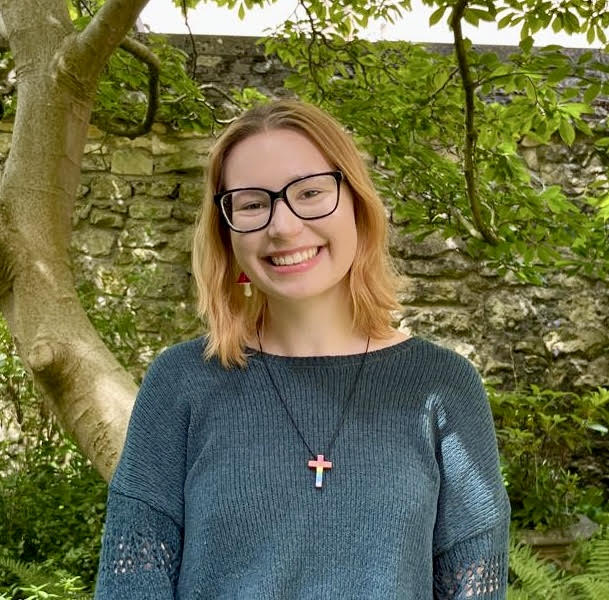Persistent in Love

October 15, 2025
by
Rachel Esser (she/her)
Throughout scripture, we find stories of seemingly impossible scenarios resolved through faith in God and community. Today, Rachel Esser reflects on our inherent need for community and the ways in which it manifests in our modern world.
October 19, 2025: Twenty-Ninth Sunday in Ordinary Time
Exodus 17:8–13
Psalm 121:1–8
2 Timothy 3:14–4:2
Luke 18:1–8
Persistent in Love
A reflection by Rachel Esser
If all Scripture is “inspired by God and is useful for teaching” as our second reading today states, allow me to bring in some Scripture from outside today’s readings: “it is not good for [a person] to be alone” (Gen. 2:18). We all exist in a tight-knit ecosystem sustained by the ever-present, ever-flowing Love that created the universe. It is this sustaining love that our readings today teach us to tap into. When facing hardship alone, Moses, Timothy, and the Persistent Widow are each aided by community.
In our first reading, we hear the story of Moses, Joshua, and the Amalekites. When Amalek went to war against Israel, God instructed Moses to send Joshua and his army out to the battlefield, while Moses remained standing on the hill with his arms raised. So long as Moses’ arms were raised, Joshua would succeed. However, it is impossible to keep one’s arms raised for extended periods of time. Inevitably, Moses’ arms would drop, and Amalek’s army would take control of the fight.
In our second reading, Paul writes a message of faith to Timothy. Founding and sustaining new churches is no simple task, and we know from Paul that Timothy was young (1 Tim. 4:12). Timothy likely had times of doubt and distress when proclaiming the word, whether it was “convenient or inconvenient."
Finally, in our gospel, Jesus tells the disciples a parable in which a widow continuously seeks out the aid of her local judge because someone has wronged her. The judge, however, is uncaring and consistently turns her away. As a widow, she was not only without a husband, but she also held no rights in that society.
Hope seems far off in each of these readings. But what changes the end of these stories is that each was persistent, and none of them were alone.
Aaron and Hur come to the aid of Moses, struggling with the weight of the battle on his shoulders. They bring him a rock to sit on, and each takes one of his arms for the duration of the battle. Joshua’s army is victorious because of the support offered to Moses by his brother and friend.
Paul’s letters to Timothy list numerous early church members who worked alongside them and supported their work: Luke, Mark, Onesiphorus, and Aquila, as well as the women Prisca, Eunice, and Lois. While Timothy undoubtedly struggled and was persecuted, he was not alone in his ministry. The early church founded communities; it did not just convert individuals.
Even the widow was not completely alone. God intervened in her struggle to change the judge’s heart, and he ultimately came to her aid. When we are suffering in this world, God never abandons us.
When the task is impossible, when we feel unworthy, when our political leaders fail us, we must support one another. Alone, it is much easier for doubt, depression, anxiety, and suffering to overwhelm us. Community is the antidote. Like Aaron and Hur, when you see someone struggling to make it through the day, give them a hand. Like Paul, give others words of encouragement. Like the parable of the persistent widow, seek out those who are alone. Ask for help when you need it and extend a hand when you are able. The work is often long and difficult, but it is possible.
Sometimes asking for help is the hardest part, especially when we have been denied help in the past. When communities have hurt us, it can be difficult to allow ourselves to be in community again. Many queer people have been hurt by the church in a way that can make being part of a faith community extremely difficult. But we don’t just deserve a healthy and loving community, we need it.
As humans, we often forget that we are a part of creation. Like the animals and the trees, we exist in an ecosystem sustained by interdependence. The trees give us the air that we breathe. Forests grow because the birds carry their seeds. The birds are fed by the berry bushes. The berry bushes are pollinated by the bees. The bees receive their nutrients from the nectar and pollen of these plants. We were created of the same stuff as the earth. We all need each other in our bones.
If you need a breath of fresh air, find your community. Being a part of Dignity has been that air in my lungs on many hard days. After the conference in July, I felt like I could fly, and the young adult group has been a consistent source of laughter and support for the past year. Having a local chapter community for the past few months in Boston has been game-changing.
Sometimes finding this community takes persistence. There may not be an affirming church in your area, or you could be in a community in which it is not safe to be out. Maybe you’ve just changed jobs or moved cities and need a new community. No matter where you are in the world or in life, I hope you find your community, both for yourself and for the ecosystem that greatly benefits from your presence in it. Find the people who make it easier to breathe.
Looking for your community? Find local Dignity chapters and online affinity groups here.

Rachel Esser (she/her) is a St. Louis, Missouri native currently working towards her MA in Theology and Ministry at Boston College. She joined DignityUSA in 2024 and loves being a part of the Young Adult Caucus. She hopes to continue the work already being done for LGBTQ+ advocacy and inclusion in the church through her own call to ministry.





.svg)


.svg)
